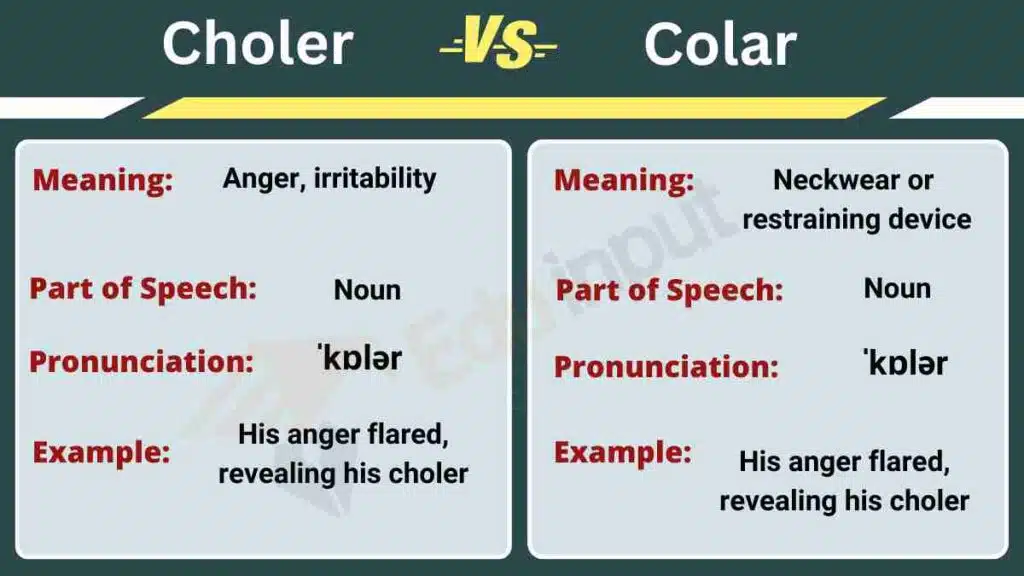Choler vs. Collar – Difference Between and Examples
“Choler meaning anger represents intense fiery emotions. Meanwhile, ‘collar’ is slang for the hangman’s noose, a symbol of execution. These words reveal the depth of human emotions and the historical weight behind certain objects.”

In the English language, words that sound alike or have similar spellings can often carry different meanings and contexts. “Choler” and “collar” are two such terms that, despite their resemblance, refer to distinct concepts.
In this article, we will explore the differences between “choler” and “collar” to gain a deeper understanding of their definitions and usages. By distinguishing between “choler” as a synonym for anger or irritability and “collar” as a type of neckwear or a restraining device, we can effectively communicate and use these words correctly in their respective contexts. Let’s delve into the contrasts between “choler” and “collar.”
Meanings and Examples
Let’s see the meaning and examples of choler and collar:
Choler Meaning
The meaning of choler as a noun is:
Noun: Choler is an archaic term that refers to anger, irritability, or a state of being easily provoked.
Choler Examples
Different examples of choler are given below:
- His constant complaints and fits of choler made it difficult to have a peaceful conversation with him.
- The hot weather seemed to increase his choler, causing him to snap at everyone around him.
- She managed to maintain her composure despite her colleague’s outbursts of choler during the meeting.
- The author’s writing was often filled with choler, reflecting his discontent with society.
- His choler subsided once he took a few deep breaths and calmed himself down.
Collar Meaning
Noun: Collar is a type of neckwear that encircles the neck, typically made of fabric, leather, or metal. It can be worn for fashion, identification, or as part of a uniform.
Additionally, “collar” can also refer to a restraining device placed around an animal’s neck or a part of specific machinery.
Collar Examples
- She wore a stylish pearl necklace with a diamond pendant that hung gracefully from her collar.
- The dog’s collar had an identification tag attached to it, displaying the owner’s contact information.
- The police officer grabbed the suspect by the collar and led him away to the patrol car.
- The mechanic tightened the collar on the pipe to prevent any leaks.
- He adjusted the collar on his shirt to ensure a neat and professional appearance.
Differences Between Choler and Collar
Choler and collar are grammatically different from each other. Main differences between both are given below:
| Criteria | Choler | Collar |
| Meaning | Anger, irritability | Neckwear or restraining device |
| Part of Speech | Noun | Noun |
| Pronunciation | ˈkɒlər | ˈkɒlər |
| Usage | Describing a state of anger | Referring to neckwear or a restraining device |
Use of Choler and Colar in a Paragraph
His sudden outburst of choler startled everyone in the room. He clenched his fists and raised his voice, venting his frustration at the situation. It took a few moments for him to calm down and regain his composure, apologizing for his display of anger.
The elegant lady wore a stunning dress with a lace collar, adding a touch of sophistication to her ensemble. The collar beautifully framed her face and accentuated her neckline, creating a fashionable and polished look.
By understanding the distinctions between “choler” and “collar,” we can use these words accurately in their respective contexts. “Choler” refers to anger, irritability, or being easily provoked, while “collar” denotes neckwear or a restraining device. With this knowledge, we can effectively communicate and avoid confusion when discussing emotional states or referring to items related to neckwear or restraint.







Leave a Reply